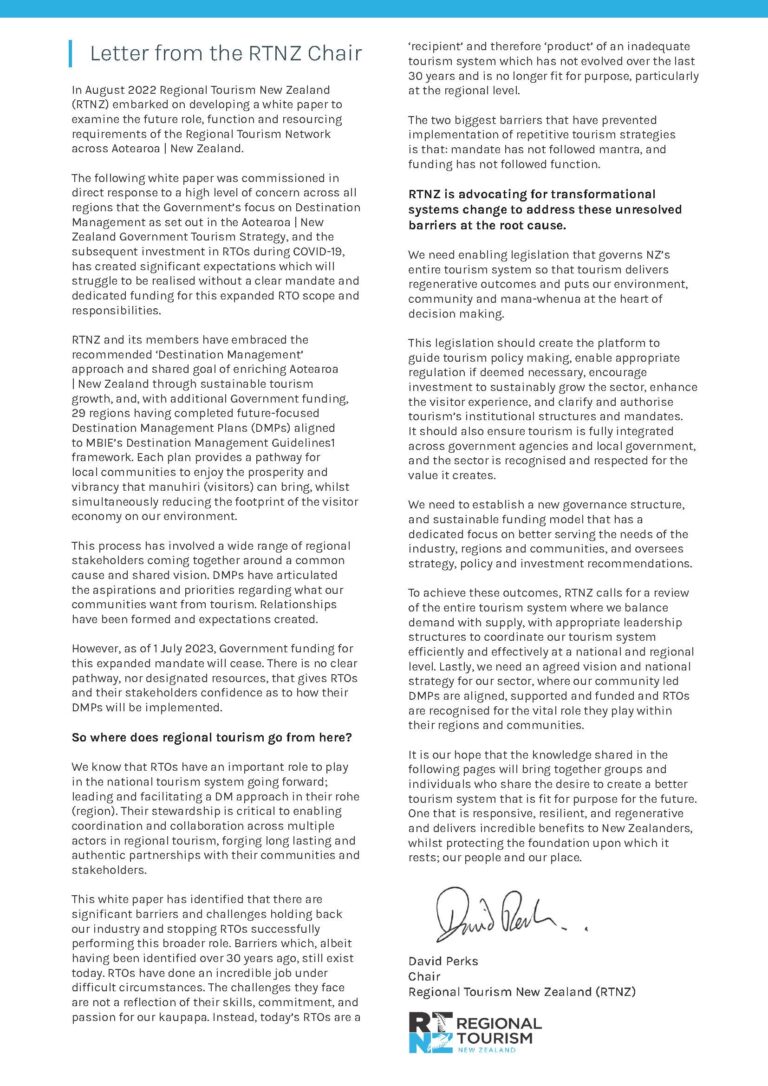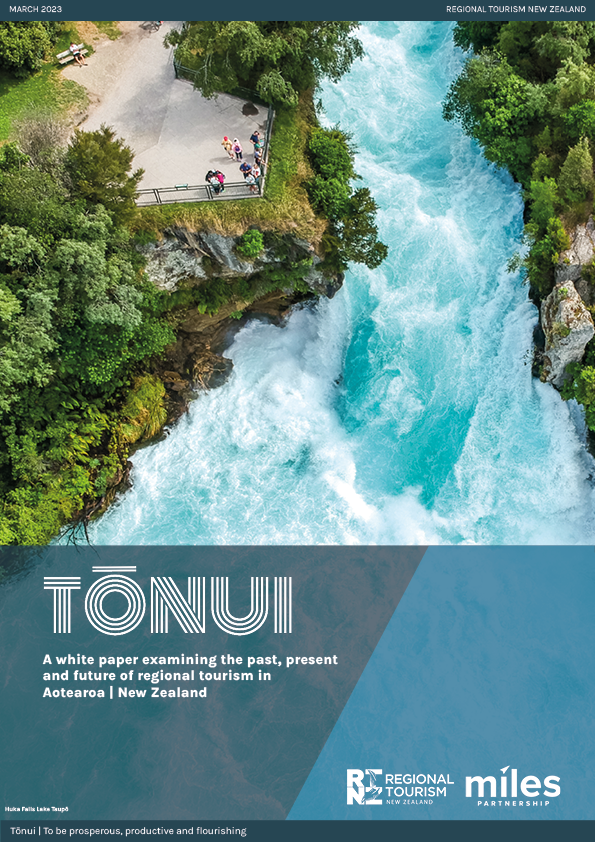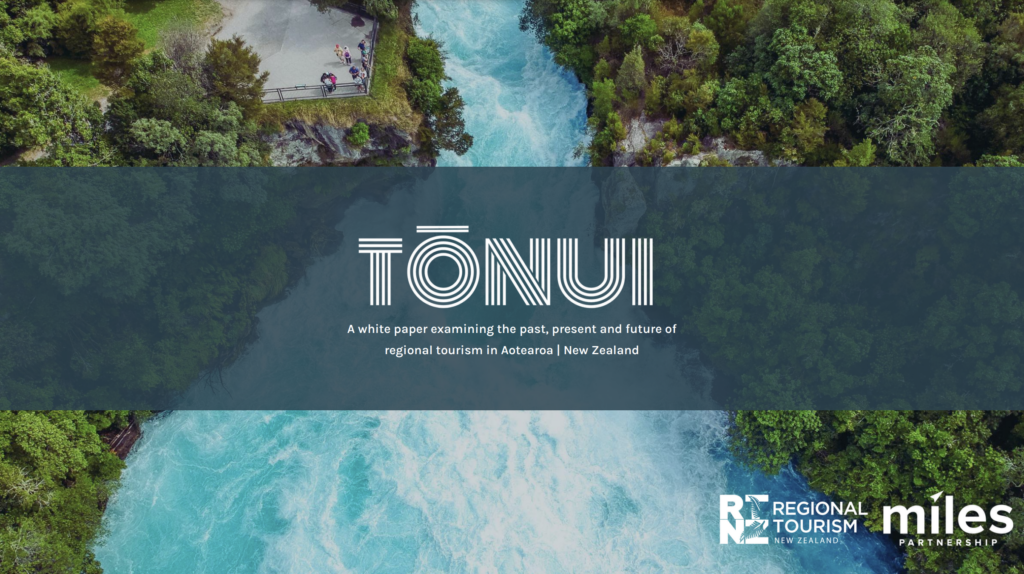White paper
Project Tōnui
A white paper examining the past, present and future of Regional Tourism in Aotearoa New Zealand.
Date published: May 2023
Project Tōnui - Frequently Asked Questions
Why did RTNZ decide to do this piece of work?
Over the past few years our industry and regions have been focused on a broader destination management approach which was recognised by the Government’s Tourism Strategy in 2019and Destination Management guidelines.
RTOs also received COVID relief funding from Government to facilitate the development of a Destination Management Plan for their regions. There are currently 26 completed DMPs and the last three due for completion by June 2023. Government funding for this work comes to an end in June and from July onwards RTOs baseline funding from councils will return to previous levels, and for some RTOs is reducing.
It was unclear as to what role RTOs should play in supporting the implementation of their DMPs and how they could be more fit for purpose for the future given the challenges and opportunities our sector faces. RTNZ needed to clarify this, so we commissioned this whitepaper to to help define what role RTOs could perform and what resourcing would be required to be effective.
From what we could see, no one had really defined the regional tourism system. Today’s system was set up 30 years ago, so we needed to look more closely at this and whether it was fit for purpose to serve the future requirements of our sector.
We looked at other international models with the global shift to destinations becoming more sustainable and regenerative. What they were doing from a systems perspective, their policies, structures, and funding models.
Why has the number of RTOs not been addressed?
The purpose of the white paper was to better understand what the role and function of a RTO should be in the future; it wasn’t about defining how many RTOs there should be.
The number of RTOs is not something that is determined by an industry policy or strategy, it is determined by local government as they are the primary funders, so therefore local government determines how many RTOs there are.
We needed to focus on what their rolecould be, what we needed from a regional tourism system for the future.
The white paper identifies that our current regional tourism system isn’t optimal and we need to change this.
Who is Project Tōnui for?
It is for the tourism sector. Whilst we started out focusing on RTOs and their governors and funders, it became apparent that this is a whole of sector and tourism systems issue. It is for the private and public sector. RTNZ is advocating for a transformational system change, and we appreciate we will need support across the industry and public sector, everyone workingtogether to progress this.
What are the key recommendations?
A key recommendation is that we need to consider introducing enabling legislation specifically for tourism.
Currently there is no legislation or ‘official’ mandate for tourism outside the New Zealand Tourism Board Act which pertains to Tourism New Zealand. When we look internationally, this appears to be a gap.
If we had enabling legislation in place, it would provide the mandate and foundation to guide policy, determine our governance and leadership structures, roles, responsibilities and accountabilities of across the tourism system.
It is difficult to define the regional tourism system without addressing this. Today’s RTOs are a ‘recipient’ and therefore ‘product’ of an inadequate tourism system which is largely determined by local government.
There is also no ‘official mandate’ for tourism within local government, it is purely discretionary activity, local government chooses how they support tourism, or not. There is also no requirement to align to industry or government strategy.
New Zealand needs to decide what it wants from tourism and then design a tourism system that can deliver this. We believe this needs to start with enabling legislation to set the foundation and then everything should follow from there e.g. policy, structures, funding.
There has been discussions recently about ‘how we pay for tourism’, how we pay for key infrastructure to support our sector, invest in sustainability, climate change adaptation and mitigation initiatives etc. and also implement the new DMPs. Also, how do we better fund RTOs so that they can continue to play a leadership and facilitation role in their regions.
We need to address this and find sustainable funding mechanisms for our sector. Funding thatis robust, resilient, adaptive and address issues at place. It needs to be transparent and equitable, so all can sustainability grow and manage their tourism industry.
There are lots of international examples that we can draw from. We need something that is future-proofed and provides greater certainty so we can plan with confidence that we have the resources/capital to invest where needed.
We also need a single tourism strategy and agreed vision for our sector.
We have a Government strategy, and an industry strategy and other initiatives such as industry transformation plans. This approach fragments an already fragmented industry. We need a single strategy aligned to our Destination Management Plans. This will require a top down, bottom-up approach.
What is RTNZ's view on the white paper?
RTNZ fully supports the findings of the white paper and the recommendations. We agree we need to deal with the root cause, these issues have been around for 30 years, now is the time to address them. What we have at a regional level is no longer fit for purpose, however, the RTOs can’t resolve this. The Government and industry needs to.
What do you expect to come from this?
We hope that this white paper will ignite discussion and debate and a recognition that change isrequired. An acknowledgement that our system if sub-optimal, particularly at a regional level.
RTNZ wants to work with Government and leaders in the sector to look at our tourism system, including how legislation can better enable and mandate the sector. In the short term we need to address the funding gap and support RTOs with the implementation of their DMPs alongside industry and communities. Local government is unable to do this.
Investigating the introduction of legislation, systems, structures and funding models will take time. We need funding in the immediate term to keep momentum and continue the Destination Management work.
The Government’s Industry Transformational Plans will need RTOs to support it on the ground. As of July, most RTOs won’t have the capacity to do so without additional support.
What do you expect from the industry?
We don’t think some of this will be a surprise. However, the need for legislation will be a new concept for many. We think there will be various opinions and views which is great. The purpose of the paper was to shine a light on our regional tourism system, and we will be pleased if it generates discussion and debate.
What are the next steps for RTNZ?
Project Tōnui will be shared with our tourism partners such as TIA, TNZ and NZMT, and those that contributed.
We will present it to the Minister and MBIE and ask for a response to our recommendations. We would like a commitment that the Government will undertake a systems review and investigate how legislation can mandate and enable tourism. We want to talk to as many people across the sector as possible. We also hope that it informs TIA’s strategy refresh.
How should the Governance Boards of RTOs respond?
We hope that they take the time to read the document and submit their views to RTNZ. We don’t envisage any change in the short term, however, we would like their support for a better regional system, clarity of roles and functions, and a sustainable funding model that enables RTOs to do their job effectively so regions can realise their DMP aspirations and priorities.
How do you think Local Government will respond?
Local Government are key partners in our tourism industry. Their resources are stretched considerably. We hope that the white paper is of assistance, and they too recognise the need for change. We hope they support a better funding model, and that the recommendations in Project Tōnui can create better outcomes for the wellbeing of their communities from tourism.
RTOs will be reliant on Local Government for continued funding through the next long term plan and would want that support to continue while we work through these complex macro issues. We would want Local Government to be a key partner in defining a new tourism system and funding model.




